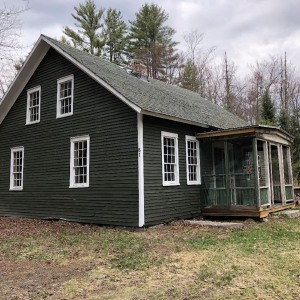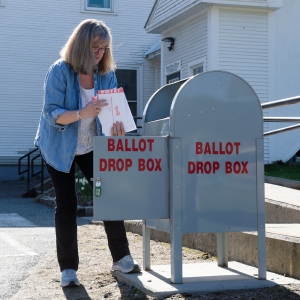NH pushing for water quality review
| Published: 07-09-2023 7:27 PM |
New Hampshire is asking the officials in charge of its 1,200 water systems to find any service lines that may contain unhealthy levels of lead and copper. It’s part of an effort to meet updated federal water quality standards. In drinking water, the primary source of lead is from pipes, according to the U.S. Environmental Protection Agency. Drinking water can account for 20% or more of lead exposure, which can have harmful health effects, particularly for children.
In 2021, the EPA tightened regulations on permissible concentrations of lead in drinking water in an effort to decrease public health impacts from lead.
Referred to as the Lead and Copper Rule Revision, this policy requires water system operators across the country to collect data on lead service lines, as well as create a plan to remove and replace these lines. State environmental agencies have until Oct. 16, 2024, to receive these inventories, under the new federal rules.
A goal of these updated rules is to eliminate lead in drinking water. But the new rules still allow up to 10 parts per billion of lead in water. As states do their inventories, any taps at or exceeding that threshold must eventually be replaced under the updated federal regulations.
Nearly half of New Hampshire residents get their water from private wells, which aren’t subject to the regulation, so it will also be important to verify if you are connected to a public water system.
New Hampshire is getting $140 million from the Bipartisan Infrastructure Law to inventory its public water systems and update any service lines.
A lot of those systems are small, with fewer than 1,700 connections each. The state has hired four water quality consultants to work with those smaller local water systems to collect data on service lines and create plans for lead service line removal and replacement. All that information should be made publicly available, in keeping with the updated federal regulation.
Each water system operator, with the help of their consultant, will be responsible for reaching out to residents with more details about tap water sampling, water meter inspections and any water service line replacements that may occur.
Article continues after...
Yesterday's Most Read Articles
 Dartmouth administration faces fierce criticism over protest arrests
Dartmouth administration faces fierce criticism over protest arrests
 Hanover house added to New Hampshire Register of Historic Places
Hanover house added to New Hampshire Register of Historic Places
 Sharon voters turn back proposal to renovate school
Sharon voters turn back proposal to renovate school
Water systems that serve more than 1,700 connections weren’t eligible for free consulting services smaller ones are receiving. But grant money is available to collect data and planning.
You can find which consultant is working with your local water system online at: tinyurl.com/5hw9mppu.
There are a couple of ways to assess the likelihood of lead in water. One can be through an inspection of the water meter, repair records, historical records or material records known as tie cards, said Jennifer Mates, a water engineer with the state’s environmental services department.
Mates said it’s essential for residents to be responsive if they get calls or letters from their local water system operators or consultants, especially when it comes to accessing water meters as part of the data collection process.
Hazen and Sawyer, one of the consultants hired by the state, plans to launch a website by mid-July to keep track of available inventories. They also plan to provide workshops, webinars and other materials for small water system operators.
“I know this seems really complex, but I just want to focus on what the data we get is going to depict,” Patricia Kelliher, a senior engineer with Hazen and Sawyer, said at an informational meeting the firm hosted in June. “As clear of a picture you can give us of your system, can really streamline the process (toward compliance).”
While most of the communication sent to residents will come from individual water providers, the Department of Environmental Services plans to offer webinars, guidance documents and other resources to keep water system operators on track and to keep residents informed.
Heather Baron, lead control specialist with the state environmental agency, said residents can call their water provider for any information on their water service line, as they might already have records available.
“It’s always going to be great to reach out to your water systems directly if you have any detailed questions,” Baron said. “There’s no sense in someone being overly concerned if there are things their system already knows.”
If residents want to learn if there’s lead in their water, Baron said the state has created a guide on how to test their taps. The EPA also has a Spanish guide. You can report these results to your water provider and the state environmental department.
The inventories and planning are just the first step. The EPA is also proposing a new rule called Lead and Copper Rule Improvements, which will be finalized before the inventories’ deadline in 2024. This wouldn’t be enforced for a few more years, but it could include updated sampling and notification requirements.
It’ll be a few years before the service lines that are flagged because of high lead levels are required to be replaced. But privately owned service lines — think water lines from the sidewalk up to your property — have different stipulations in the updated regulation.
If water system operators identify private lines that contain lead, homeowners or property owners will be responsible for paying for these replacements themselves.
“Each water system is going to have to develop a funding strategy to address that portion of the work,” said Mates, with the state environmental services department.
Mates said the state has a separate funding stream that will be used for service line replacements, which may help water system operators in making private service line replacements more affordable.
These articles are being shared by partners in The Granite State News Collaborative. For more information visit collaborativenh.org.

 Students take down pro-Palestinian encampment at UVM
Students take down pro-Palestinian encampment at UVM
